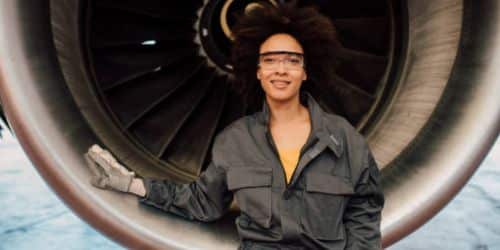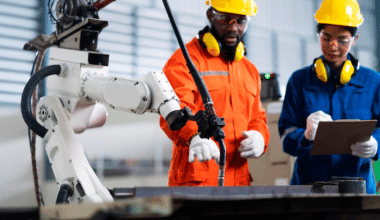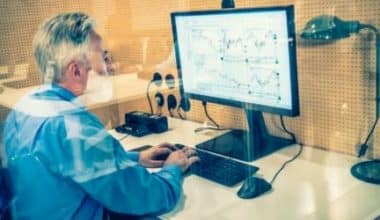The aerospace industry is a rapidly growing and exciting field that demands technical knowledge and creativity from an engineer. This post details the job description, duties, and salary range of an aerospace engineer, covering their skills, qualifications, and duties. It also discusses factors affecting earning potential.
Who is an Aerospace Engineer?
Aerospace engineers are highly skilled professionals responsible for designing, developing, and testing various complex systems, including aircraft, spacecraft, satellites, and missiles. These professionals are at the forefront of technological innovation, working to create cutting-edge solutions that push the boundaries of what is possible in aerospace engineering.
What Does an Aerospace Engineer Do?
Aerospace engineers design, build, and test planes, satellites, weapons, and spacecraft. They also make and test samples to ensure they work how they are supposed to. Aerospace Engineers use mathematical, scientific, and engineering principles to design, improve, and repair various aircraft and spacecraft components.
Aerospace Engineer Job Description
The job description of an aerospace engineer includes designing, repairing, and enhancing air and spacecraft components, materials, and manufacturing processes. Their job description includes the following:
Duties of an Aerospace Engineer
The duties of an aerospace engineer can vary depending on the specific job and company, but here are some common responsibilities and tasks that can be expected:
- Aerospace engineers create innovative, efficient designs for aerospace products or systems, utilizing technical knowledge and expertise to meet customer requirements.
- Engineers direct and coordinate engineering activities in aircraft design, fabrication, modification, and testing, ensuring efficient project execution with team members.
- They create design criteria for aerospace products, defining testing methods, production costs, quality standards, and completion dates to meet requirements and specifications.
- They conduct tests on aircraft and equipment, evaluating performance and reliability and identifying improvements.
- Aerospace engineers analyze data, inspection reports, and design documentation to ensure compliance with engineering principles, customer requirements, and quality standards.
- An aerospace engineer creates technical reports, handbooks, and documentation for staff, management, and customers.
- Aerospace engineers analyze customer and field reports, inspect malfunctioning products, and identify design flaws or manufacturing issues.
- Aerospace engineers are essential in research and development programs, advancing technology, and improving aircraft and spacecraft performance.
- Aerospace engineers assess proposals, data, and vendor performance to determine feasibility, cost, and production time.
Salary of Aerospace Engineer
The average salary for an aerospace engineer in the United States is around $122,270 annually. The wages typically start at $77,440 and can go up to $168,370. However, the salary of an aerospace engineer usually differs by state.
The top five states with the highest salary for an aerospace engineer are:
- Nevada $124,154
- Massachusetts $121,854
- Alaska $117,430
- Washington $113,300
- New York $110,283
The experience level of an aerospace engineer also plays a role in determining what the salary will be. Entry-level engineers with less than 1 year of experience can expect to earn an average total compensation of $75,295. Also, the salary range for an aerospace engineer working for NASA is $177,782.
How To Become an Aerospace Engineer
To become an Aerospace Engineer, you will need to follow these steps:
#1. Develop Strong Math and Science Skills in High School
Take classes in physics, algebra, chemistry, calculus, and trigonometry. These classes will provide a solid foundation for the more advanced coursework you will encounter in college.
Joining an astronomy or computer programming club or participating in a science or engineering competition can help you gain practical experience and demonstrate your interest in the field.
#3. Strengthen Your Analytical Skills
Aerospace engineering requires critical thinking and problem-solving abilities. Playing mental games like crossword puzzles and chess can help develop these skills.
#4. Get a Bachelor’s Degree in Aerospace Engineering
Apply to colleges and universities with aerospace engineering programs. Ensure the institutions you apply to are ABET-accredited, as most employers prefer degrees from accredited schools. During your undergraduate studies, you will take courses in laboratory field studies, stability and control, mechanics, aerodynamics, propulsion, and moving objects.
#5. Earn a Master’s or Doctoral Degree
While not always required, a graduate degree can enhance your career prospects and provide a deeper understanding of the field. Some aerospace engineers choose to pursue a Master’s or Doctoral degree after gaining some industry experience.
#6. Gain Practical Experience
Seek internships or apprenticeships in the aerospace industry to gain hands-on experience and make connections. Some organizations, like NASA, offer apprenticeship programs for students pursuing science, technology, engineering, or mathematics degrees.
#7. Develop Strong Writing and Business Skills
Aerospace engineers must document their work and write papers describing their designs. Taking classes in writing and business can help you develop these skills.
#8. Consider Working as an Aerospace Engineer Technician
Becoming a technician in aerospace engineering can be a stepping stone to gaining valuable experience and making connections in the industry. This position may require less education than a full-fledged aerospace engineer.
What Skills Do Aerospace Engineers Need?
Aerospace engineers require technical skills, soft skills, and educational qualifications to excel in their field. Here are the key skills that aerospace engineers need:
#1. Technical Skills
- Proficiency in programming languages such as C++ is important for aerospace engineers, as it is one of the most common hard skills required in the industry.
- The job description of an aerospace engineer requires the knowledge of specific industry-related software and tools.
- Strong mathematical skills, including a solid understanding of calculus, trigonometry, and other advanced topics, are essential for analysis, design, and troubleshooting in aerospace engineering.
- Familiarity with engineering principles, mechanics, propulsion, and aerodynamics is crucial for aerospace engineers.
- Experience with research and development, including basic and applied research, is valuable for aerospace engineers.
#2. Soft Skills
- The job description of an aerospace engineer requires analytical skills, as they need to identify design elements that may not meet requirements and formulate alternatives to improve performance.
- Critical thinking skills are necessary so that engineers can translate issues into requirements and find acceptable solutions.
- Strong writing skills are important for aerospace engineers to articulate their ideas, write papers explaining designs, and create documentation for future reference.
- The job description of an aerospace engineer requires problem-solving skills, who often need to troubleshoot and resolve issues during design, installation, and maintenance.
- Excellent communication and teamwork skills are essential for aerospace engineers, as they often work in multidisciplinary teams and collaborate with different stakeholders.
- Aerospace industry employers value project management experience and leadership skills.
#3. Educational Qualifications
- A bachelor’s degree in aerospace engineering or a related field of engineering or science is typically required for entry-level positions in aerospace engineering.
- Some universities offer cooperative programs and internships to provide students with practical experience in the field.
- Pursuing a master’s degree in aerospace engineering can provide advanced knowledge and open up opportunities for research or teaching positions.
What Tools Do Aerospace Engineers Need?
As an aerospace engineer, there are several tools that you may need to use for various tasks. Here are some tools commonly used by aerospace engineers:
- Abrasive tools: These are tools aerospace engineers use for material removal and surface preparation, such as sanding and grinding. They help shape and finish components.
- Air drills and accessories: Air drills drill holes in various materials. Accessories like drill collets and lubricants are also used with air drills.
- Application tools and accessories: These tools apply sealants, adhesives, and other materials. Tools like sealant guns and accessories help with precise application.
- Assembly tools: Aerospace engineers use assembly tools for joining components together. They include rivet guns, skin pins, clamps, and fastening tools.
- Cable, wire, and tubing tools: These tools work with cables, wires, and tubing. Examples include wire twisters and cable/tubing tools for cutting, stripping, and crimping.
- Cutting tools: Cutting tools are for cutting and shaping various materials. They include composite cutting tools, countersink cages, back spotface cutters, punch and cutting tools, and saws.
- Hand tools: Hand tools are essential for various tasks. They include aviation snips, wrenches, pliers, screwdrivers, and other tools commonly found in a toolbox.
- Inspection tools: Inspection tools are used for quality control and measurement. They include lighting, mirrors, cable tension meters, and testing and measuring equipment.
- Material removal tools: Material removal tools are used for deburring and removing excess material. Examples include deburring tools, as well as rivet shavers.
- Riveting tools: Riveting tools are used for joining components using rivets. They include blind riveting tools, rivet guns, squeezers, and stationary riveters.
- Sheet metal forming equipment: Sheet metal forming equipment shapes and bends sheet metal.
- Shop tools: Shop tools are general tools used in a workshop. They include air hoses, shop equipment, and other tools commonly used in manufacturing and maintenance.
Software and Analysis Tools for Aerospace Engineers
- Aerospace design software: Specialized tools are used for aerospace design, analysis, and simulation. These tools help in modeling and evaluating air and space vehicles. Examples include CAD software, simulation software, and analysis tools.
- Engineering software tools: Aerospace engineers use various software tools for computations, assessments, modeling, simulation, and analysis. Some tools are custom-built in-house, while others are commercial off-the-shelf tools.
- Measuring instruments: Precision is crucial in the aerospace industry, and aerospace engineers use various instruments for accurate measurements. Commonly used instruments include micrometers, gauges (such as bore gauges and calipers), and thread pitch gauges.
Where Can an Aerospace Engineer Work?
An aerospace engineer can work in different sectors within the aerospace industry, including:
- Aerospace manufacturing companies: Aerospace engineers work for aircraft, spacecraft, and component manufacturers, ensuring quality and design-based production and assembly.
- Research and development organizations: Research and development organizations explore advanced technologies for aerospace system performance.
- Government agencies: Aerospace engineers can work for NASA or the military, and contribute to space exploration, defense, and national security initiatives.
- Airlines and aviation companies: Aerospace engineers work for airlines and aviation companies, focusing on aircraft maintenance, optimization, and fleet management.
- Aerospace consulting: Aerospace engineers offer specialized expertise in project management, system design, regulatory compliance, and performance optimization.
- Academic and research institutions: Aerospace engineers can work as professors, researchers, or technical staff in universities and research institutions. They contribute to academic programs, conduct cutting-edge research, and mentor aspiring aerospace engineers.
Can Aerospace Engineers Go to NASA?
Yes, aerospace engineers can work at NASA. NASA hires aerospace engineers for various roles related to space exploration, spacecraft design, and research and development. NASA usually hires aerospace engineers with bachelor’s degrees in aerospace, aeronautical, manufacturing, electrical, or software engineering. At NASA, aerospace engineers are involved in designing and developing aerospace systems, conducting research and analysis, testing and evaluating prototypes, collaborating with multidisciplinary teams, ensuring compliance with regulations, overseeing production and manufacturing processes, and monitoring and maintaining aerospace systems.
Where Do Most NASA Engineers Go to College?
The University of Houston has the highest number of college graduates employed at NASA, accounting for 12% of the entire NASA permanent workforce. The University of Maryland is a close second with 11.1%.
What GPA Is Required for NASA?
The GPA requirement for NASA internships and programs is generally 3.0 or higher, but there may be some flexibility depending on the specific opportunity and the strength of the rest of the applicant’s resume. Therefore, check the requirements and preferences stated in the internship posting or application materials for the most accurate information.
Do Aerospace Engineers Make Money?
Aerospace engineers can make a good amount of money, but the exact salary can vary depending on experience, location, and employer.
Is It Hard To Get a Job as an Aerospace Engineer?
The job market for aerospace engineers can be competitive. Getting a job as an aerospace engineer can be difficult or easy, depending on your qualifications, experience, and the job market. However, you can join an aerospace engineering technician company and receive on-the-job training to qualify as an engineer. Additionally, having experience in related fields such as mechanical, electrical, or electronics engineering can be beneficial when applying for aerospace engineering jobs. Also, the ability to adapt to different roles within the aerospace industry can make you more hireable, as employers are often looking for candidates who can learn new skills and apply their knowledge in various areas.
Related Articles
- The Top 10 Industries That Rely on Sheet Metal
- SpaceX Logo: What is the Real Meaning of the Logo?
- NASA LOGO: History, Evolution, Meaning, What it Symbolizes
- FRONT END DEVELOPER: What They Do & How To Become One






